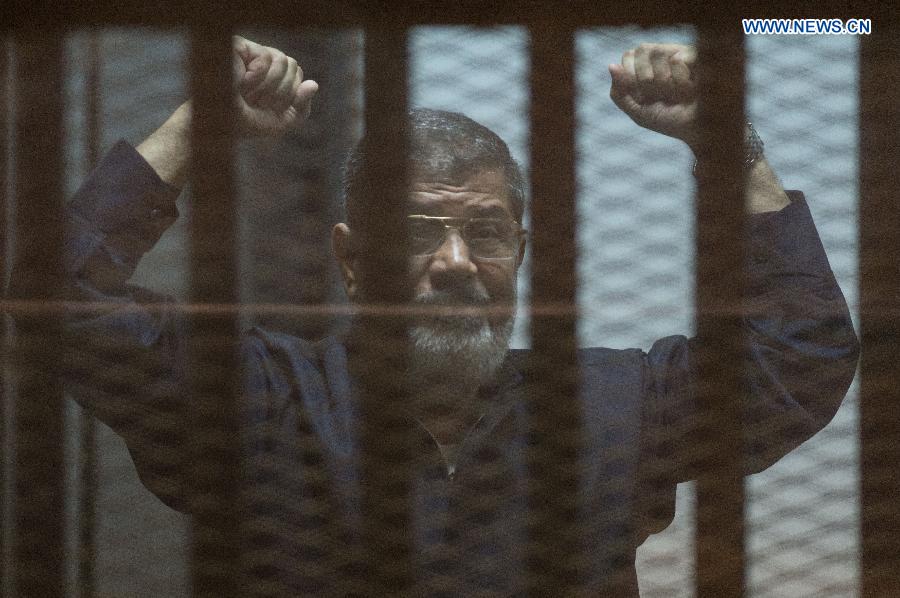
Egypt's ousted President Mohamed Morsi gestures behind the defendants' cage at a court in Cairo, Egypt, on June 16, 2015. An Egyptian court on Tuesday confirmed the death sentence against ousted President Mohamed Morsi over mass jailbreak during the 2011 political turmoil, state-run Nile TV reported. (Xinhua/Pan Chaoyue)
CAIRO -- An Egyptian court on Tuesday confirmed the death sentence against ousted President Mohamed Morsi over mass jailbreak during the 2011 political turmoil.
The general guide of the Muslim Brotherhood, Mohamed Badie, and four other Brotherhood leaders were also handed the death penalty.
In the same case, more than 90 others, including the famous preacher, Youssef Al-Qaradawi, who resides in Qatar, were handed death sentence in absentia.
Investigations unveiled the defendants plotted the killing of police troops in the country's main three prisons and released almost 20,000 prisoners along with kidnapping three border guards and policeman and forcing them to leave for Gaza Strip via tunnels, set up by Palestinian militants on the borders between Egypt and Gaza, the presiding judge, Shaaban Al-Shami said.
Earlier on Tuesday, the court sentenced Morsi to 25 years in prison, in a separate case related to conspiring with foreign groups against the country's national security. He were accused of conspiring with foreign militant groups Hamas and Hezbollah against the country.
In the same case, the court confirmed death sentences against 16 other defendants, including Kairate El-Shater, a Muslim Brotherhood top leader, Mohammed al-Beltagi, Freedom and Justice Party's secretary general, and Ahmed Abdel-Aaty, former presidential aide who served under Morsi.
Death sentences were also handed to 13 other defendants in absentia on spy charges.
Tuesday's ruling came after the court received the report of Egypt's grand mufti, the country's interpreter of Islamic law who plays an advisory role.
Presiding judge Al-Shami said despite Mufti's opinion isn't obligatory, but his report that confirmed with the judges' panel decision, is important as it emerged from the Islamic jurisprudence.
Tuesday's verdicts can be appealed.
Morsi, the country first elected president, was ousted in 2013 by the army in response to mass protest against his rule. He has already been sentenced to 20 years in jail in a separate trial on charges of inciting violence.
The security crackdown on his supporters has left nearly 1,000 killed and thousands in jails.
Morsi's Brotherhood group was outlawed by the government, and most of his Brotherhood group were facing trials over violence, killing and espionage.
The government accused Brotherhood of carrying out attacks and bombings against the security forces and government institutions in revenge.
On Monday, "Revolutionay Punishment Militia," a newly declared Brotherhood affiliate, posted a statement on its facebookpage, in which the group confessed running of 124 terrorist attacks in the last six months which led to the death of 157 persons.
Meanwhile, sources inside the Brotherhood abroad unveiled initiative to quit the political life in Egypt for ten years for release of all the group prisoners.
But nothing officially reported yet on reconciliation between the group and the country.
In Alexandria, dozens of Morsi's supporters flocked to the streets to protest his death verdict.
Meanwhile the security forces intensified its existence around the most famous squares across the country in anticipation of more protests.
Initial death sentence against Morsi and swift mass death sentences against Brotherhood members were internationally criticized.
Ahmed Ban, expert with Nile Center for political studies, and a Brotherhood dissident, said the verdict could be appealed several times, predicting president al-Sisi will pardon him if finally Morsi reached execution.
He added both the country and the Brotherhood group will seek reconciliation, but each is waiting for more concessions.